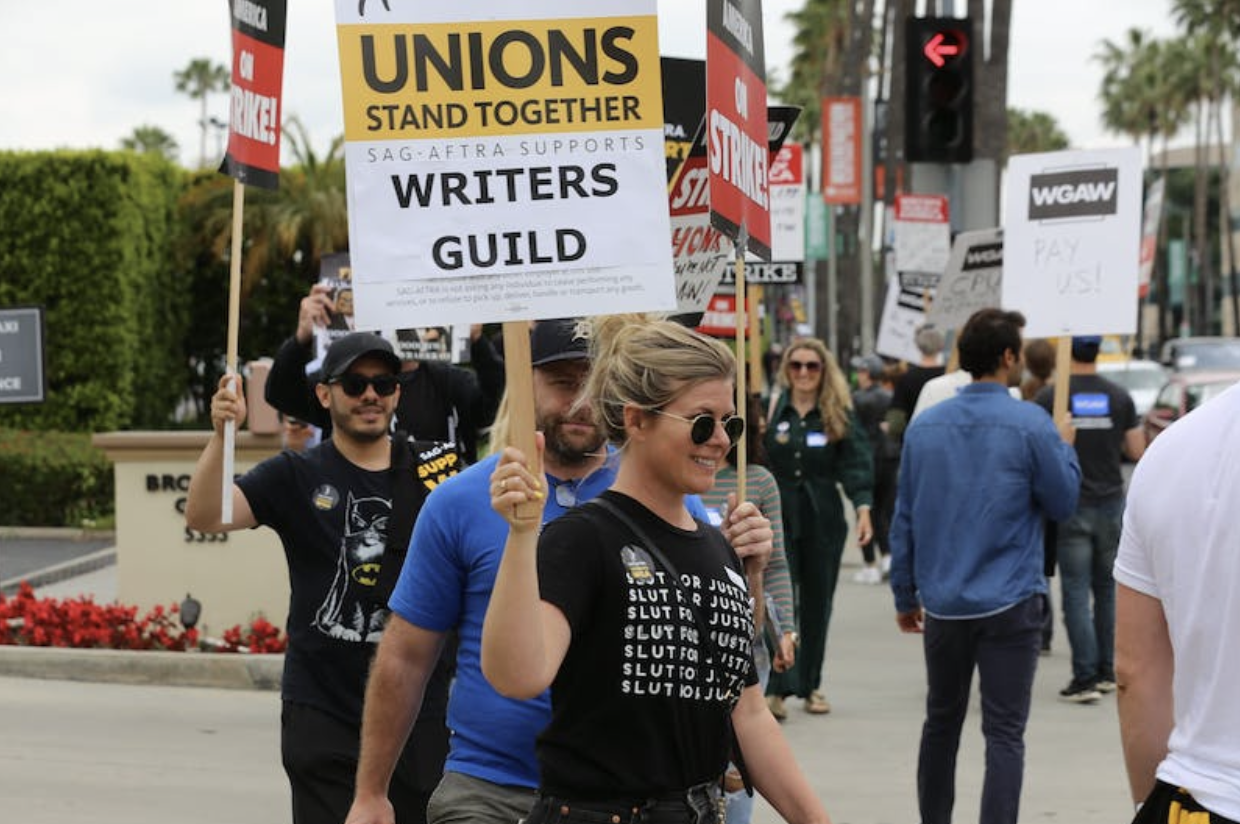Barbenheimer: the unforeseen marketing strategy that’s gained more than 2 billion USD in the box office and taken the world by storm, one which has ensured that the summer of ‘23 will certainly inspire anemoia for the coming generations. But has the pink glitter and radioactivity distracted you from the conflict that has been theorized to cause the turning point of the entertainment industry as a whole?
The birth of artificial intelligence and the death of a profession first recorded more than five thousand years ago. Do these two events really coincide? The Writers Guild of America (WGA) seems to think so, as the 8th of September marked 130 days since they took to the picket lines in strike. The last time there was a writers’ strike (that of 2007-2008 which lasted just 100 days) California’s economy alone lost 2.1 billion. The difference this time? The major ethical question at play. Because when it comes down to it, the dispute the WGA and the Alliance of Motion Picture and Television Producers (AMPTP) have been negotiating is not just about Hollywood and our favorite stars, but rather how workers should be treated in light of the technological revolution.
When we come to think of modern day Hollywood the glitz and glamour certainly shines through our perception. Between MET Gala invites and mounds of money to be made it’s hard not to envy the workforce behind the majority of our entertainment. But a harsh reality awaits workers behind the scenes. Many of the people who write the shows and movies we know and love have been left with unlivable wages, whilst studios such as Amazon, Netflix and Disney have been left to thrive with the prolific spoils of said workers. Only twenty years ago Hollywood’s writers were living the dream, twenty episodes per season with more constantly in the work, plus a percentage of profit whenever their show aired left them with steady, livable income. Now, in the age of streaming platforms notorious for underpaying workers and never quite revealing their own profit, the majority of writers are left with only one (usually minimum wage) job per year, and they can forget about seeing even a percentile of that revenue.On May 2nd, 2023, following six weeks of negotiation with the studios under the AMPTP umbrella (including Netflix, Amazon, Apple, Disney, Sony and Paramount), the WGA commenced an ongoing strike. The vote to authorize said strike amounted to a shocking majority at 97.85 percent of members voted in favor. The WGA and the AMPTP refused to back down, leaving both parties at a standstill. Then, just two months later Screen Actors Guild-American Federation of Television and Radio Artists (SAG-AFTRA) joined the strike against the AMPTP; according to recent statements the Guild will continue to do so until fair terms are agreed upon. SAG-AFTRA and the WGA are united in strike for the first time in sixty years to achieve one common goal: to make sure the very people that serve as the foundation for the entertainment industry are earning their fair share, and not being exploited by the power hungry studios who have built an empire on profiting off of others work. This goal has only been made more prominent in light of a societal enigma: Artificial Intelligence.
The companies’ behavior has created a gig economy inside a union workforce, and their immovable stance in this negotiation has betrayed a commitment to further devaluing the profession of writing. From their refusal to guarantee any level of weekly employment in episodic television, to the creation of a “day rate” in comedy variety, to their stonewalling on free work for screenwriters and on AI for all writers, they have closed the door on their labor force and opened the door to writing as an entirely freelance profession. No such deal could ever be contemplated by this membership.
Around the time that negotiations with the AMPTP first began, so did the rise of AI. At an already detrimental turning point in the very structure of the entertainment industry, AI gave studios the very edge they needed in this ongoing dispute; for them, AI is the key to getting away from these negotiations scott free. Artificial intelligence as it stands today has the ability to churn out script after script, carefully plotted to generate the biggest audience appeal — now, that combined with the theoretical potential to generate scenes without ever needing to hire actors? Suddenly none of the creatives behind the camera are needed. No, only audiences are required as the programming and the distribution companies wait with their pockets ready to be filled. The AMPTP, SAG-AFTRA and the WGA have all arrived at that realization well, leading to further dispute.
Statement put out by the WGA’s negotiation team
“There has been a sea change in the entertainment industry, from the proliferation of streaming platforms to the recent explosion of generative AI, and at stake is the ability of our members to make a living, We must ensure that new developments in the entertainment industry are not used to devalue or disrespect the performers who bring productions to life.”
Statement from Duncan Cabtree-Ireland, SAG-AFTRA’s Head Negotiator
The AMPTP refused to completely forgo using AI in their works, going against the demands of SAG-AFTRA and the WGA. Instead the AMPTP continues to suggest half measures, with clear hopes to bend such agreements to their whim. What started as a relatively simple debate over pay models has opened the floodgates for countless revaluations of the entertainment industry. Is it ethical to knowingly let AI replace countless jobs in an already unstable job market? Should we try to amend the fact that other lower paying jobs have already been replaced by such technology? Why are we fighting the sure change which is about to take place in Hollywood? Is there a way to incorporate AI into creative industries without its power overwhelming them?
Whatever the answer to all those questions we know some things for certain. With the members of the WGA refusing to write any new work (including the continuation of projects including Deadpool 3, Euphoria, the seventh Scream installment), countless fan favorites are being cancelled or indefinitely postponed. Studios and streaming platforms are directing their audiences’ anger towards the strikers, instead of the systemic problems they themselves built.
“The WGA Bargaining Committee’s rhetoric is unfortunate. This strike has hurt thousands of people in this industry, and we take that very seriously. Our only playbook is getting people back to work.”
AMPTP statement obtained by The Wrap
Members of the striking Guilds cannot work on or market any of the AMPTP’s projects without severe consequences, leaving many in financial peril. And the debate of the incorporation of AI into Hollywood continues to go without a clear conclusion. Everyone from the audiences to the strikers themselves are stuck waiting for the end of the seemingly evergoing negotiations while the future of our favorite shows and movies is looking bleak.
But we shouldn’t just worry about our entertainment. The WGA strikes will be the first of many conflicts regarding fair pay and the legality of incorporating AI into an industry. Whatever the outcome of these strikes, the standard for the future of many, if not all jobs will be set. Audiences around the world should be awaiting the conclusion of these protests just as they would the season finale of their favorite show. Because once this very public debate is concluded, countless others will commence, and we can be sure other jobs won’t get the coverage and press that the WGA, SAG-AFTRA and their glamorous Hollywood origins have been granted.
Bibliography:
Bult, Laura. “How Streaming Caused the TV Writers Strike.” Vox, 7 June 2023, www.vox.com/videos/2023/6/7/23752811/wga-writers-strike-streaming-television.
Espada, Mariah. “How the SAG-AFTRA Strike Affects TV and Movies.” Time, 20 July 2023, time.com/6296449/sag-aftra-strike-tv-shows-movies/#:~:text=In%20July%2C%20the%20Screen. Accessed 22 Sept. 2023.
Kilkenny, Katie. “What Writers Can Work on during the Strike (It’s Not Much).” The Hollywood Reporter, 4 May 2023, www.hollywoodreporter.com/business/business-news/writers-strike-rules-wga-what-to-work-on-1235478494/. Accessed 22 Sept. 2023.
Lindsay, Benjamin. “AMPTP Responds to WGA Strike Statement ahead of Meeting.” TheWrap, 3 Aug. 2023, www.thewrap.com/amptp-calls-wga-statement-unfortunate-ending-strike-is-our-only-playbook/. Accessed 22 Sept. 2023.
Staff, Los Angeles Times. “Writers’ Strike: What’s at Stake and How It Could Disrupt Hollywood.” Los Angeles Times, 1 May 2023, www.latimes.com/entertainment-arts/business/story/2023-05-01/writers-strike-what-to-know-wga-guild-hollywood-productions.
“Strike Rules FAQ.” Www.wgacontract2023.org, www.wgacontract2023.org/strike/strike-rules-faq#:~:text=Guild%20Working%20Rule%208%20prohibits. Accessed 22 Sept. 2023.
Wilkinson, Alissa. “Hollywood’s Writers Are on Strike. Here’s Why That Matters.” Vox, 25 Apr. 2023, www.vox.com/culture/23696617/writers-strike-wga-2023-explained-residuals-streaming-ai#:~:text=In%20simple%20terms%2C%20a%20writers.
“Writers Guild of America Calls Strike, Effective Tuesday, May 2.” Www.wga.org, 1 May 2023, www.wga.org/news-events/news/press/writers-guild-of-america-calls-strike-effective-tuesday-may-2.Zornoza, Laura. “Why Actors Are Going on Strike.” Time, 12 July 2023, time.com/6294212/sag-aftra-actors-strike/.

